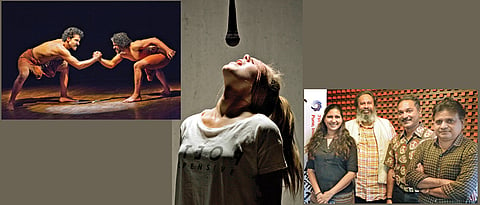

In its fourth year, the IAPAR International Theatre Festival is reaping the benefits that it accrued in the previous three editions – of bringing some never-seen-before plays from different countries to the city, working with the student community and letting them gain exposure from travelling artists, conducting workshops that encourage budding artists to hone their craft, and last but not the least, making the festival not just about theatre.
PLAYS GALORE
Giving an outline of the six day festival that starts from November 7, festival director Vidyanidhee Vanarase says, “This year, we have seven plays, which include three productions from India. Out of the three, one is from Pune. A Chinese opera will be performing for the first time in the city alongwith productions from Germany, Georgia and the USA.”
The play from Pune will be presented by a bunch of college students and working professionals. “A group of youngsters living in different parts of the state came to Pune. They wanted to do theatre, but couldn’t become a part of the existing theatre groups in the city. So they formed their own group, Rang Pandhari, and went on to win some critical acclaim with their first play. The group will be staging Nirupan, a play that sheds light on the Warkari community,” he adds.
BRIDGING BARRIERS
Dr Ajay Joshi, who is also a part of the IAPAR team, says, “In the first two editions, there were some concerns amongst the theatre-goers about plays coming in from Japan or Eastern Europe or from other parts of the country. How will we understand what the artists are trying to say, people wondered. What is heartening about the response and the buzz that we have generated this year is that the people are eager to watch these performances, crossing over the language barriers. The festival has acquired the global identity that we wanted it to achieve. We have also tried to be the bridge between practitioners and academics since our first year where we conducted a dialogue between International Critics Association and students from different universities.”
The workshops on acting, writing, folk theatre and so on were sold out within the three days of the announcement of the festival this year. “The takeaway from such festivals and workshops is enormous, both for the audience and the artists. I remember I was in my 30s when I first got an opportunity to attend a theatre festival in South Africa. I knew something shifted within me when I watched that play from a place meant for the Africans. There is lot of sharing that takes place during these festivals and I am glad that the student community here can make the most of this opportunity. For many artists, the thought of travelling abroad with their creative form stems from reluctance. After we started this festival, many budding artists are coming up to ask, ‘How can we participate in an international festival?’ I think we have breached the first hurdle ” adds Vanarase.
WHAT TO LOOK FOR IN WORKSHOPS
Sangeet Natak Akademi awardee Abhiram Bhadkamkar has been conducting workshops on writing for three years now. When asked about his experiences, the noted writer says, “It is quite apparent that the seed of how to approach a craft has been sown amongst the participants. They keep in touch, sharing their drafts with me. The workshop on writing is different from the one on acting because the module for acting has been set but there is no one fixed template for writing. Also, we need to go beyond the ‘start, middle and end’ approach. More than that, we have to be consistent, we have to keep writing.”
Vanarase adds, “This year, besides workshops on writing, acting, physical movement and folk art, we also have the Chinese opera artist talking about their craft. The Shanxi Qinqiang Opera Group will be presenting a play, The Burning Incense. In the workshop, which will be held after the play, Aiyun QI will talk about the costumes, makeup that is crucial to the opera group.”
TAKE AWAY SOMETHING MORE
Aditi Venkateshwaran, who is the festival secretary, has perceived a shift of gears when it comes to how IAPAR Festival is perceived. “Not only are we bringing together the community, we are also learning new ways on how to approach our work. There is a certain discipline which the international artists follow in their work. And they are passing it on to our practitioners and participants. We are learning about theatre methodologies, education, gender issues, politics, social attitudes. It all boils down to a simple fact that this can never be only about theatre. There is something more.”
Joshi points out that the idea is to make the performers, the audience uncomfortable. “Once a festival is set, it runs like a well-oiled machine and then one starts to get complacent. We don’t want to fall in the trap, so we have to keep doing something new,” he adds.
This year, the IAPAR is also screening a French film, Edmond a comedy drama. “It will be screened on Sunday, November 3 and will be the lead-up to the festival,” says Venkateshwaran.
THE PLAY-LIST
Nirupan (Nov 7)
Roop Aroop (Nov 8)
Rangdhuli (Nov 8)
The Burning Incense (Nov 9)
Bali (Nov 10)
Pirosmani (Nov 11)
Miss Mertens Refuses to Grow
Bigger (Nov 12)
Women of Ciudad Juarez (Nov 12)
ST READER SERVICE
The platform and main performances will be held at Jyotsna Bhole Sabhagruha, Tilak Road, between 7 and 9 pm, from Nov 7-12. The workshops will be held at Kalachhaya campus, off S B Road
